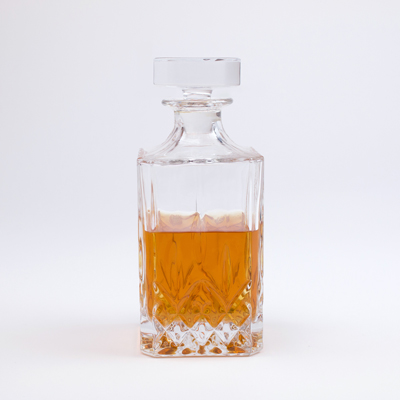You know the scene: an important-seeming dude in a suit, or Jack Donaghy, pours himself a glass of whiskey from a crystal decanter, possibly staring out the window while contemplating a recent building-swap, or whatever business people do. Sure, he might not have made the right choices on the Nikkei that day. But what about that decanter? Is it actually a good choice for whiskey?
Yes and no. Or more like no, and yes. Like a tattoo nobody can see, it’s a choice you don’t have to make, but it also can’t do a ton of harm. Especially if you plan on drinking that whiskey anytime soon.
Decanting wine serves a pretty specific, though still debated, function: removing sediment and encouraging oxidation. Decanting theoretically allows a wine to “open up” through exposure to oxygen. And while just how much exposure is really required is still debated, it’s universally accepted that decanting will change a wine, for better or ill. (Just imagine leaving your glass of Malbec unattended overnight and going back for a breakfast taste. For many reasons, it’ll be a confusing morning.)
Whiskey, on the other hand, really won’t change much with exposure to oxygen—at least, in terms of the exposure it’ll get from being poured into another container and/or the slightly less airtight seal of a whiskey decanter (vs. the bottle cap). Whiskey in a bottle that’s mostly air (since you’ve been enjoying it, you scoundrel) will oxidize, though much slower than wine.
Generally speaking, though, and backed up by none other than the Scotch Whisky Association (whom we just assume are not to be messed with), whiskey, once bottled, is a finished product. “If you keep a 12 year old bottle for 100 years, it will always remain a 12 year old whisky.” The reasons whiskey remains basically the same while wine changes have to do with a couple factors: tannins and alcohol content. Wine has a lot more tannin content than whiskey (naturally occurring in the grape, borrowed from the barrel, etc.). Whiskey has no innate tannins, and only gets a scant offering from the barrel in which it ages. Why do tannins matter? They can cause change in a bottle of wine over time, again for better or ill. Something too harshly tannic now might mellow over a few years, while you wait patiently and/or drink other, friendlier wine. Whiskey, having so few tannins, doesn’t have much chance for major evolutions in flavor, and that’s fine since a finished whiskey should taste how it tastes forever—or for as long as it lasts in your liquor cabinet.
More important than tannins: alcohol content. Wines may clock in between 11 and 15% (and higher, sure) but almost all whiskeys are bottled at a minimum of 40% ABV (higher if it’s “cask strength”). That means two things: sip your whiskey a whole lot slower, and don’t worry about pouring it into (or out of) a decanter. With such high alcohol content, the possibility for a dramatic chemical reaction from oxidation is much lower. Not that whiskey can’t change at all over time, especially if it’s been exposed to sunlight (since that’ll goose any chemical reactions that might happen) or temperature fluctuations (which may cloud the whiskey, but don’t freak out, that’s fine). And some drinkers are of the opinion that the first dram of whiskey tastes different than the rest of the bottle—but that might also be palate acclimation, since whiskey (any kind) doesn’t quite prance so much as slam dance onto your palate.
If you’re still confused, just look at the decanter. Wine decanters are specifically designed to encourage interaction between liquid and air, always without a cap, and often elaborate (and seriously breakable) in design. Whiskey decanters, on the other hand, tend to be built for stability (often with a wide bottom) and just straight-up shiny impressiveness. Air isn’t a factor in whiskey decanters, because, within a reasonable time frame, it won’t make much difference. Which is why there’s always a cap on a whiskey decanter—that big bulbous piece of glass our businessman sticks back in after pouring himself sadness Scotch.
What’s the purpose, then? Aesthetics. Though decanters did begin practically—historically it was how you got your whiskey from the barrel—these days they’re almost entirely about looks, which can range from the broad-shouldered, wide-bottomed classic to something you’d definitely see on the giant mahogany desk of a Bond villain. As long as you’re not planning on keeping that whiskey for a long time (in which case, you’d simply leave it in the bottle), decant or don’t, it’s up to you. Just make sure it isn’t a lead crystal decanter. Yes, they’re sparklier, but the cost of that sparkle could be lead leaching into your whiskey (it’ll take a while, but it happens), and that, most definitely, will change things.

